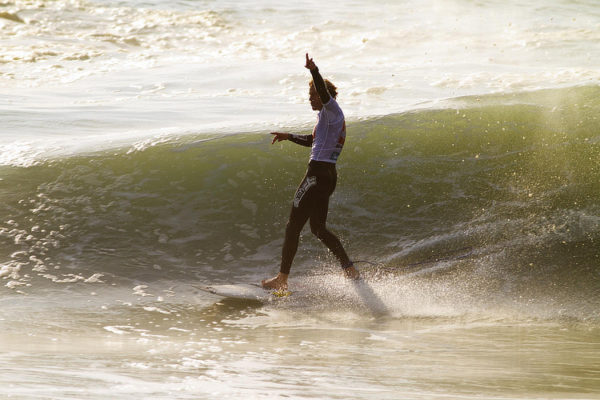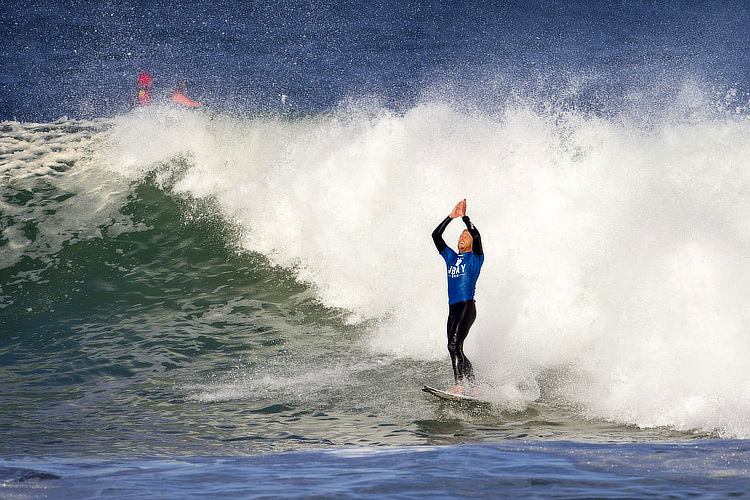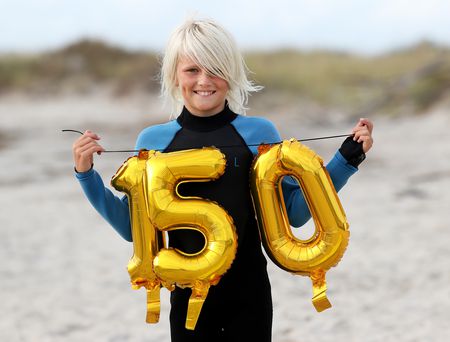A group of researchers studied whether claims influence fans and judges in evaluating performance during surf contests.
The paper entitled “Claims in Surfing: The Influence of Emotional Postperformance Expressions on Performance Evaluations” was in the Journal of Sport and Exercise Psychology in December 2019.
The analysis led by Philip Furley, a lecturer at German Sport University Cologne, focused on the post-performance nonverbal emotional expressions and their consequences, in terms of external perception.
Furley and his team wanted to know whether spectators and judges were biased by the surfers’ claims or not.
Do they get better scores after raising arms high in the air, or fist-pumping their chest?
“Today, there is a general consensus that nonverbal expressions are under both conscious, deliberate control and unconscious, autonomous control,” says Philip Furley.
“But people can also fake or modify certain nonverbal expressions in an attempt to influence observers. Claims in surfing can probably be considered a blend of spontaneous and intentionally used nonverbal expressions.”
So, surfers can be either overwhelmed by the quality of a ridden wave or just trying to influence judges in a specific moment of a heat.
The social scientist notes that emotional expressions tend to affect observers in two ways.
A judge or a spectator may conclude that a surfer performed extremely well (inference) when observing a display of pride – for example, a claim in surfing – and should be evaluated accordingly with a higher score.
But there could also be a process of emotional contagion in which people catch the surfer’s emotions through his or her facial expressions, bodily movements, and postures, or vocalizations.
“For example, when a friend starts laughing and one cannot help oneself and bursts out laughing too,” adds the German researcher.

The Experience
To run the experiment, Furley tested the hypothesis that emotional expressions – in this particular case, claims – would lead to a systematic bias in judging surfing performance by both fans and spectators (Experiment 1) and experienced surf judges (Experiment 2).
He sampled two sets of stimuli published on the World Surf League (WSL) event homepage for Experiments 1 and 2, showing video footage of professional surfers performing during heats.
“In order to have sufficient reliability, we averaged a subset of wave scores with claims and without claims that were presented in randomized order among other waves to distract from the purpose of the experiments,” emphasizes Philip Furley.
“To ensure that any potential differences in wave scores were in fact due to observing claims versus no claims and not performance differences in the video stimuli, we randomly assigned participants to two groups.”
Group 1 presented one subset of waves that displayed claims after a performance and another subset of waves that were cut before the claim was visible.
Group 2 was shown the identical waves with the only difference that the same waves that were shown in Group 1 with claims were shown in Group 2 without claims, and the waves shown without claims in Group 1 were shown with claims in Group 2.

The Results
According to the researcher from the German Sport University Cologne, the conclusions are in line with social-cognitive models emphasizing the social consequences of emotion expressions on sports performance judgments.
“Post-performance emotional expressions following surfing performance can be considered a salient cue that influences the information processing of observers and ultimately results in a systematic bias of performance judgments,” concludes Furley.
As a result, a surfer’s performance can be judged more favorably if it is followed by a claim.
“As surf contests rely on subjective judgments of judges to determine the outcome, these findings have important applied implications for judges and training programs ought to implement interventions to avoid or reduce these biases,” the academic suggests.
Philip Furley states that video-based training (see Schweizer, Plessner, Kahlert, & Brand, 2011) might help to sensitize surf judges toward claims and thereby help to diminish this bias.
In addition, the findings are in line with the more general EASI model (see Van Kleef, 2009) by demonstrating that emotional expressions following athletic performance can have interpersonal effects.
“Although it seems more likely that the interpersonal effects were primarily caused by inferential processes, we cannot rule out that some of our participants experienced some emotional contagion when viewing the claims of the surfers,” adds Furley.
Most likely, differential performance evaluations between claimed waves and waves without claims were caused by the participant’s inferential processes.
For example, they observed a display of pride and likely concluded that this surfer had achieved something extraordinary and therefore evaluated him accordingly.
Nevertheless, the German team considers it “a fruitful avenue for future research to illuminate the mechanisms of how observers are influenced by emotional expressions of athletes during sports competitions.”
Philip Furley has already published two papers on surf-related topics: “Goofy vs. Regular: Laterality effects in surfing” and “‘Eddie would(n’t) go!’ perceptual-cognitive expertise in surfing.”





Recent Comments